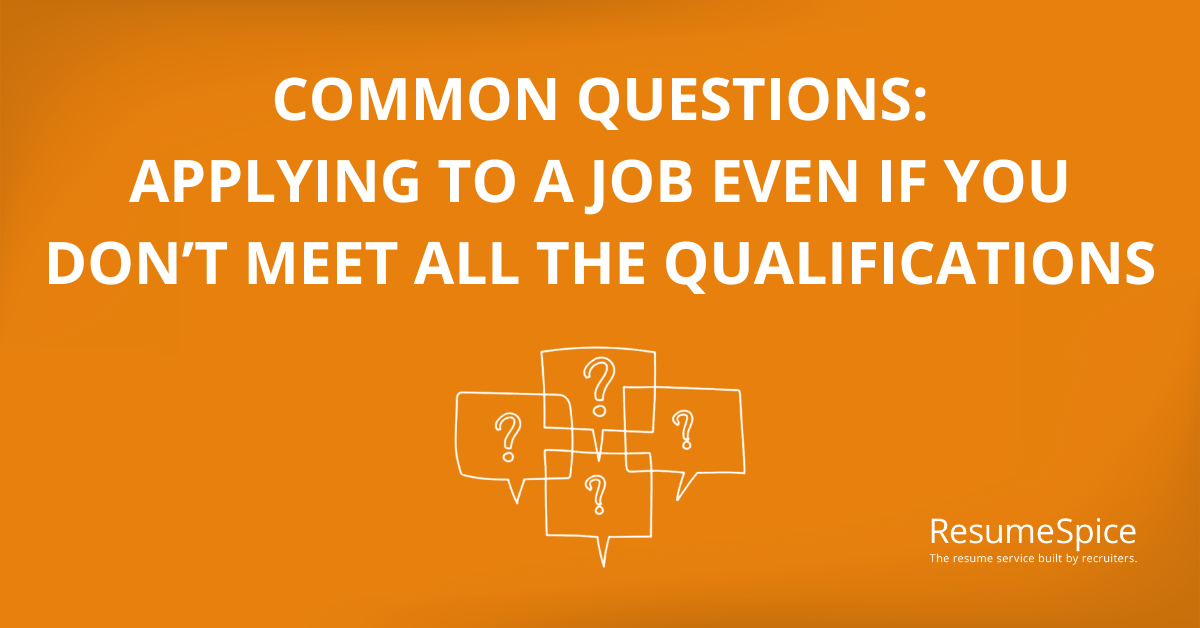Should You Apply If You Don’t Meet All the Qualifications? (Short Answer: Yes. Long Answer: Here’s How)

As Seen In:




You’ve found a role that excites you—the responsibilities line up with your career goals, and the company seems like a great fit. But as you read through the job description, doubt starts to creep in. You notice a few job requirements you don’t meet. Maybe it’s a specific software, a certain number of years of experience, or a certification you don’t have. Suddenly, you’re asking yourself the question almost every job seeker faces at some point: Should I apply if I don’t meet all the qualifications? The short answer is yes.
The long answer is a bit more nuanced—and that’s what this blog is all about. We’ll break down why you shouldn’t automatically disqualify yourself, how many hiring managers really think about job requirements, and strategies you can use to position yourself as a strong candidate even if you’re not fully qualified on paper.
Key Takeaways
Don’t self-eliminate just because you don’t meet all the qualifications.
Transferable skills, learning agility, and results can outweigh missing job requirements.
Tailor your resume and cover letter to connect the dots for the hiring manager.
Apply strategically: aim for roles where you meet most, but not all, of the requirements.
Confidence is key—sometimes the boldest step is simply hitting “apply.”
Why Should You Still Apply to a Job Even if You Don't Meet All of the Listed Qualifications?
It’s easy to second-guess yourself when a job description lists requirements you don’t fully match. But here’s the reality: very few candidates ever meet every single qualification. Hiring managers know this—and often, they’re more interested in potential, adaptability, and transferable skills than a perfect checklist. Here are a few reasons why you should still consider applying.
💭 Job Descriptions Are Wish Lists, Not Checklists
Most job descriptions are written as an ideal candidate profile—a wish list of what the hiring team hopes to find. Hiring managers often know they won’t get someone who ticks all the boxes. Instead, they’re trying to describe their “must haves” alongside a handful of nice-to-haves. If you meet about 70–80% of the qualifications, you have a good chance of getting hired.
🌱 Employers Value Potential
Many employers care about your ability to learn, adapt, and apply new skills. In today’s job market, yesterday’s “must haves” might be obsolete tomorrow. Showing willingness to grow and master technical skills quickly can outweigh not having direct expertise in one particular software or system.
🔑 Transferable Skills Are Powerful
Even if you don’t have all the requirements listed, you likely have transferable skills from other roles. Communication, leadership, problem-solving, and project management are valuable across industries. These other skills can demonstrate you’re ready to succeed in the role, even if your experience doesn’t mirror the job description word for word.
💪 Confidence Plays a Role
By self-selecting out, you might miss opportunities where your transferable skills and growth potential are exactly what the hiring manager is looking for. Confidence in your ability and willingness to learn can make all the difference.
When You Shouldn’t Apply to the Job
Reaching for roles you’re not 100% qualified for is smart—but there are limits. Not every position will be the right fit, and sometimes applying can waste valuable job search energy. Here are a few situations where it makes sense to hold back.
The core requirement is non-negotiable: For example, if the job requires a licensed CPA and you don’t have one, you won’t be hired. The same is true for jobs requiring a medical license, security clearance, or fluency in a specific language.
The gap is too wide: If you’re missing almost all the qualifications, it might be a long shot and not the best use of your job search energy.
The role doesn’t align with your career goals: Applying just because you like the company name or potential employer brand can set you up for dissatisfaction. Make sure it’s a step in the direction you want to go.
🔶 Tip: If you’re unsure whether a role truly fits into your bigger picture, check out our guide on Career Clarity: What to Do When You Know You Need a Change—But Don’t Know What’s Next (8 Steps).
How Hiring Managers Evaluate Candidates
Knowing how recruiters and hiring managers review applications can give you an edge in the job search. While it’s tempting to focus only on checking every box in the job description, hiring decisions are based on much more than that. Here’s what matters most to a hiring team:
⚖️ Qualifications are weighted
Not every item on the job description carries the same importance. Some job requirements are true must haves—like a specific license or certification—while others are simply “nice-to-haves.” If you meet the minimum requirements and show that you’re capable of learning the rest, you can still be considered a strong candidate.
🤝 Culture fit counts
Beyond technical skills, employers want people who will thrive in their environment. Do your values align with the company’s mission? Will your communication style work well with the team? Many hiring managers say they’d prefer to hire someone with slightly less direct experience but who clearly fits the culture over someone who doesn’t.
💬 Soft skills matter
Communication, adaptability, leadership, and problem-solving often rank higher than technical skills. Employers know they can train someone on software or tools, but it’s much harder to teach qualities like collaboration or resilience. Highlighting these in your resume and cover letter can help you stand out.
📈 Growth potential is attractive
Hiring teams aren’t just looking at what you’ve done—they’re looking at what you could do next. Showing your ability and willingness to take on challenges, learn new skills, and continue developing can make you more appealing than someone who looks fully qualified but doesn’t demonstrate motivation to grow.
🏆 Results outweigh responsibilities
A list of duties won’t capture attention. Hiring managers want to see impact. Did you increase revenue, improve efficiency, or deliver measurable outcomes? Sharing results with metrics gives employers a clear picture of how you could add value if hired.
🔶 Tip: Our professional resume writers specialize in turning responsibilities into measurable accomplishments that get noticed – get in touch with the ResumeSpice team today.
How to Apply to a Job with Confidence (Even If You Don’t Meet Every Requirement)
So, you’ve decided the position is worth pursuing even if you don’t check all the boxes. The good news? Many employers are less concerned with perfection and more interested in potential. Here’s how to strengthen your application and approach the process with confidence.
Highlight transferable skills: Emphasize strengths that carry over from past roles, even if your experience isn’t an exact match.
Back it up with results: Use measurable outcomes—like revenue growth, time savings, or efficiency gains—to prove your impact.
Tailor your materials: Align your resume and cover letter with the job description and make sure it’s clear how your background connects.
Show learning agility: Point to examples where you picked up new skills quickly and adapted to new challenges.
Leverage your network: A referral can help you get noticed, even if you’re not fully qualified.
Polish your presence: Keep your LinkedIn and online presence updated and professional.
Address gaps with confidence: Be prepared to explain in an interview why you’re still the right fit despite missing a requirement.
🔶 Tip: Nervous about how to explain your background in person? Our interview prep services can help you practice your pitch with confidence.
Summary
The job search can feel intimidating, especially when you don’t line up perfectly with a job description. But here’s the truth: most successful candidates have been hired into roles they weren’t 100% qualified for at the time. Growth happens on the job.
So, the next time you hesitate on a role because you’re missing some of the listed requirements, remember this: employers aren’t looking for perfect—they’re looking for promise, ability, and people who can deliver results.
Q&A
Q: How many qualifications should I meet before applying?
A: Aim for at least 70%. But if you’re passionate about the position and can demonstrate transferable skills, go for it even if you’re closer to 60%.
Q: Should I mention the missing qualification in my cover letter?
A: Only if it’s noticeable and you can spin it positively. Otherwise, focus on your strengths and other skills.
Q: What if the posting says “must have” for something I don’t have?
A: Treat that as non-negotiable. If the job requires something essential like a license, you likely won’t be hired without it.
Q: Will applying hurt my chances with the company for other roles?
A: Not at all. If anything, it shows initiative. If you’re not selected, the recruiter may consider you for another position.
Q: What if I get rejected?
A: Don’t take it personally. Every rejection is practice. And sometimes rejection leads to another opportunity within the same company.
Ready to Land Your Next Role?
If you’re ready to position yourself more effectively in your applications, ResumeSpice can help. From personalized resume writing services and career coaching and interview prep (and more!), our team knows how to highlight your strengths and help you apply for a job with confidence.









